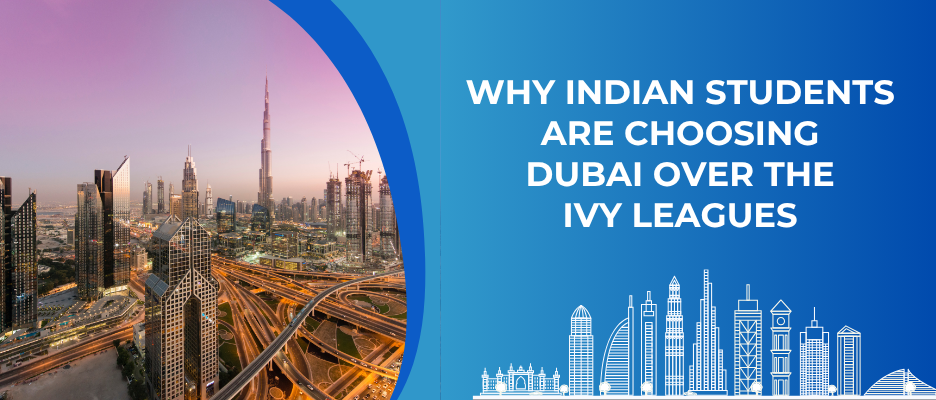Once known primarily for its iconic skyline and world-class tourism, Dubai has deliberately invested in becoming an academic powerhouse, attracting leading universities and creating opportunities that rival the West.
Today, the city is home to more than 30 international branch campuses, including institutions from the UK, U.S., India, and Australia. What this means for students is clear: access to globally recognised degrees without the financial or cultural challenges often faced in distant countries.
For Indian students especially, Dubai has shifted from being a weekend holiday destination to a serious academic home. Its location—strategically placed between East and West—makes it not only geographically convenient but also culturally balanced. Students experience the best of both worlds: the comfort of a familiar diaspora and the exposure of studying in a truly global city.
The appeal is evident in the numbers. Over 100,000 Indian students are now enrolled in Dubai’s higher education institutions, making them the largest international student community in the UAE. This surge reflects more than convenience—it highlights a broader shift in priorities. Where once “Ivy League” was the ultimate aspiration, now students are drawn to Dubai’s unique blend of quality, affordability, and career-focused outcomes.
So what makes Dubai stand out? Beyond its modern campuses and multicultural environment, it’s the promise of growth. Students are not only earning degrees; they’re building careers in one of the fastest-growing economies in the world. With flexible visa policies, tax-free part-time work, and pathways to long-term residency, Dubai is crafting a future where education and opportunity are seamlessly connected.
Your study abroad journey deserves more than prestige—it deserves purpose. And for many Indian students, that purpose-driven path is leading to Dubai. In this blog, we’ll explore the reasons behind this shift and the opportunities that make Dubai a destination worth serious consideration.
As MDOEC – Best Overseas Education Consultants, we’ve seen this shift firsthand. Let’s explore what’s driving the trend, and why Dubai is no longer just a city of dreams—it’s a city of degrees.
9 Reasons Dubai Is Winning Over Indian Students
1. International Universities With Global Recognition
One of Dubai’s biggest strengths is its cluster of globally renowned universities. Students can study at branch campuses of top institutions and graduate with the same degree awarded at the home campus abroad. This means the prestige, quality, and global recognition remain intact—without the distance or cost of studying in the U.S. or U.K.
Some of the top international universities in Dubai include:
- Heriot-Watt University Dubai – strong in engineering, business, and design.
- University of Birmingham Dubai – a Russell Group university ranked among the world’s top 100.
- Middlesex University Dubai – globally reputed for law, media, and business programs.
- American University in Dubai (AUD) – popular for architecture, design, and business.
- BITS Pilani, Dubai Campus – ideal for engineering and technology aspirants.
- University of Wollongong Dubai (UOWD) – renowned for business, IT, and innovation.
- Canadian University Dubai – diverse programs with Canadian curriculum links.
- Curtin University Dubai – with global ties in Australia.
- University of Manchester Global MBA Centre – world-ranked MBA without leaving Dubai.
- Manipal Academy of Higher Education (MAHE) Dubai Campus – strong in health sciences and engineering.
For Indian students, this is a golden opportunity: study in Dubai under world-class faculty, gain an international degree, and still remain just a few hours from home.
2. KHDA and Education Reforms – Raising Standards
Dubai’s Knowledge and Human Development Authority (KHDA) has played a transformative role in building trust in the education system. KHDA regularly inspects, rates, and monitors universities, ensuring high quality and transparency. Families can access ratings and reports before choosing a university.
Additionally, the UAE’s Vision 2030/33 reforms aim to make Dubai one of the world’s leading education hubs by:
- Expanding scholarships for international students.
- Simplifying visa processes.
- Ensuring 90% of graduates are employed within a short time frame.
- Strengthening partnerships with global industries.
This government-backed commitment to quality and employability is something Ivy League universities—while prestigious—cannot always guarantee, especially for international students.
3. Proximity and Cultural Comfort
For Indian parents, one of the biggest concerns is how far their child will be from home. The U.S. is at least a 20-hour flight away. Dubai? Barely 3–4 hours.
Add to this the 2 million+ Indian diaspora in Dubai, and students find themselves in a city that celebrates Diwali, serves Indian food on every corner, and feels like a home away from home. This cultural familiarity eases the transition and reduces the anxiety parents often feel when sending their children abroad.
4. Cost Advantage – Smarter ROI
An Ivy League degree can cost upwards of INR 60–80 lakhs per year. Compare that with Dubai:
- Tuition fees are lower.
- Living costs, while higher than India, are significantly lower than New York or London.
- Scholarships up to 50% are available.
- Students can work part-time (up to 15 hours weekly during semesters and 40 hours during breaks) in a tax-free economy.
This makes Dubai not just affordable but a smarter return on investment (ROI). Families save significantly while students still gain international exposure and career opportunities.
5. Simplified Admissions – No Red Tape
The Ivy Leagues are notorious for their hyper-competitive admissions—acceptance rates often below 10%. Dubai, by contrast, offers a streamlined and student-friendly process:
- Many universities waive IELTS/TOEFL if students have studied in English-medium schools.
- Multiple intakes (Jan/Feb and Sep/Oct) allow flexibility.
- Entry requirements are transparent and accessible.
For Indian families, this reduces stress and ensures opportunities are not lost to rigid systems.
6. Career-Ready Education
Unlike many Ivy League universities that are research-heavy, Dubai’s programs are career-focused. Universities in Dubai design curricula in collaboration with industries, ensuring students graduate with job-ready skills.
Key advantages include:
- Built-in internships with global firms based in Dubai.
- Exposure to industries like fintech, logistics, healthcare, hospitality, and AI.
- Networking opportunities in a city that is home to Fortune 500 companies and startups alike.
This practical orientation is why Dubai is increasingly seen as the bridge between education and employment.
7. Visa and Work Opportunities
Another reason Dubai is winning over Indian students: clear post-study pathways.
- Long-term student visas ensure stability.
- Golden Visas (10 years) are awarded to top students and professionals.
- Students can sponsor their families—a rare option in countries like Canada or the UK.
- Structured employment pathways help graduates quickly find jobs.
Compared to the uncertainties of U.S. H-1B lotteries or the U.K.’s recent restrictions, Dubai feels like a safer bet for long-term career planning.
8. Safety, Lifestyle, and Global Exposure
Dubai consistently ranks among the world’s safest cities. Strict laws, advanced infrastructure, and world-class healthcare give parents peace of mind.
Beyond safety, students experience:
- A cosmopolitan lifestyle with peers from 200+ nationalities.
- Advanced transport, smart city infrastructure, and modern housing.
- A global cultural mix—preparing students for international careers.
While Ivy League universities offer prestige, Dubai offers a balanced lifestyle where education, safety, and exposure come together seamlessly.
9. Challenges Students Should Consider
- Higher living costs compared to Indian cities.
- Extreme summer heat, which requires adjustment.
- Cultural norms are stricter, requiring awareness and respect.
At MDOEC, we guide students honestly, ensuring they understand both opportunities and limitations before committing.
FAQs: Dubai vs Ivy League
1. Why are Indian students choosing Dubai over Ivy League universities?
Because Dubai offers globally recognised education, simpler admissions, lower costs, better career opportunities, and proximity to home—all in a safe, cosmopolitan environment.
2. Are Dubai degrees recognised globally?
Yes. Branch campuses award the same degrees as their parent universities abroad.
3. How does Dubai compare in cost to the Ivy Leagues?
Dubai is significantly more affordable—both tuition and living costs are lower, and students can offset expenses with part-time work.
4. What career opportunities are available after studying in Dubai?
Students gain access to internships and jobs in finance, IT, logistics, hospitality, and emerging fields like AI and renewable energy.
5. Can students stay in Dubai after graduation?
Yes. With Golden Visas and clear work pathways, students can transition from academics to employment smoothly.
6. Is Dubai safe for Indian students?
Absolutely. Dubai ranks among the safest cities in the world and has a large Indian community for added support.
7. How does MDOEC support students aiming for Dubai?
MDOEC provides personalised guidance—shortlisting universities, securing scholarships, handling applications, visa support, and preparing students for life in Dubai.
Final Thoughts
For Indian students, the Ivy League dream isn’t fading—it’s evolving. While the prestige of Harvard or Princeton is undeniable, Dubai offers a smarter, more practical route: world-class universities, affordability, cultural comfort, career-ready education, and secure visa pathways.
At MDOEC – Best Overseas Education Consultants, we believe Dubai is no longer just an alternative; it is the new frontier in global education. For students and families seeking the perfect blend of quality, safety, and opportunity, Dubai is proving to be the smarter choice of the future.
The dream has shifted—from Ivy towers to desert horizons—and for many Indian students, Dubai is where global aspirations meet achievable reality.






